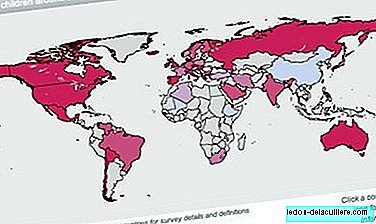Summer has just begun, but according to a survey conducted by the Groupon company to 1,500 Spanish mothers and fathers, 75 percent of them feel guilty of the holidays they plan to give their children, since they consider that they do not live up to the expectations they have.
This feeling of guilt, which is increased by witnessing the vacation plans that friends and acquaintances share on social networks, leads parents to spend an average of 150 euros a week more in goodies, activities and gifts to compensate your children.
In search of the perfect vacation
The school is over and the children are looking forward to enjoying the two months of vacations that lie ahead. Surely if we asked them what their "perfect vacation" would be like, most would tell us that making sandcastles on the shore of the beach, playing in the park until sunset and enjoying the days without a clock.
But nevertheless, for Spanish parents this does not seem to be enough. This is at least a survey carried out by Groupon to 1,500 fathers and mothers with children between five and 16 years old.
AdvertisingOf these, 34 percent have been planning summer vacations for three months, and 75 percent feel bad because they believe that what they plan to do is not up to their children's expectations.
But in addition to this uneasiness, the survey has revealed that parents experience a great sense of guilt during the summer for the little time they spend with their children, as well as for the activities that they do in their absence, or that on the contrary they cannot do because they do not spend time together.
The guilt of the parents
"Time" is a fundamental factor and is capable of generating a surge of negative feelings in parents when summer vacations arrive. The fact that the children said goodbye to school puts parents in the position to decide what to do with them, especially when they must continue working.
This decision is not always easy to make, and on many occasions it causes big headaches which increases the feeling of guilt in parents:
48 percent feel guilty for spending little quality time with their children.
21 percent feel guilty for the amount of time your children spend at home.
29 percent feel guilty because their children don't spend enough time doing activities.
28 percent He has pretended to be sick so as not to go to work and be able to spend a day with their children.

But in addition to the time factor, there are other situations that occur especially at this time of year, which overwhelm and frustrate parents, and which are in descending order:
The fact that children spend many hours in front of the television, computer, or iPad
Not being able to afford to go on many trips or perform day activities
Running out of ideas to keep kids entertained
Stay at home instead of going out and enjoy different leisure experiences
Feel that the children of others are enjoying summer more than yours
Unable to afford to go on vacation
Say no to requests for sweets, new toys and children's trips
Don't organize more educational and cultural events
The bad behavior of their children in public places
Bed children late
The pressure of social networks
 These feelings of guilt increase in 26 percent of cases, when parents look at the photographs of vacations that other families publish on their social networks.
These feelings of guilt increase in 26 percent of cases, when parents look at the photographs of vacations that other families publish on their social networks.In addition, in 27 percent of the occasions parents say they feel especially bad when their children tell them about the activities or trips that their friends will make.
And sometimes idyllic landscapes and the bucolic everyday scenes that some parents publish on the Internet, make others feel pressured for not being able to offer their children the same, believing that these are the perfect vacations that children would like to have.
However, 27 percent of parents admit that the photographs they publish on the Internet do not reflect their daily reality, and that they only echo the best images of their summer.
Even so, a fifth of respondents admit to feeling great pressure when posting photos of their vacation on Instagram or Facebook, because they want them to look perfect.
The cost of guilt
Guilt leads to 72 percent of parents and 67 percent of mothers to spend more money than usual on activities and gifts to compensate your children.
Specifically, fathers and mothers spend an average of 150 euros more per week and per child, than they would spend in another period of the year.The money that parents spend on children during the summer is distributed, according to the survey, as follows:
29 percent spend more money than usual on treats, sweets and ice cream.
48 percent spend money going out to dinner at fast food establishments.
39 percent opt for amusement parks and film sessions.
20 percent of respondents say they have even bought electronic devices from their child, including iPads and video games.
Being parents for your child, not for social networks
According to those responsible for the survey, the data show that social networks cause a lot of tension among families, wishing to have a perfect summer vacation and live up to what others publish.
But when they are not able to get it, parents experience great guilt, feeling that what they can offer their children is not up to what they expect.
 However, the really important thing about summer is not that it looks perfect on our social networks, nor filling our children with material goods thinking that is what they want.
However, the really important thing about summer is not that it looks perfect on our social networks, nor filling our children with material goods thinking that is what they want.And is that It is not necessary to have a high budget to spend an unforgettable summer in family. The important thing is those moments that we are treasuring day after day, those spontaneous and fun moments that will remain forever etched in our memory and in that of our children.
In Babies and More The “screen time” is more than setting limits, A mother blogger reminds us that motherhood is not as seen in social networks, Planning a children's party: when social networks put us very high expectations, Small family traditions: create routines that your children will remember all their lives












